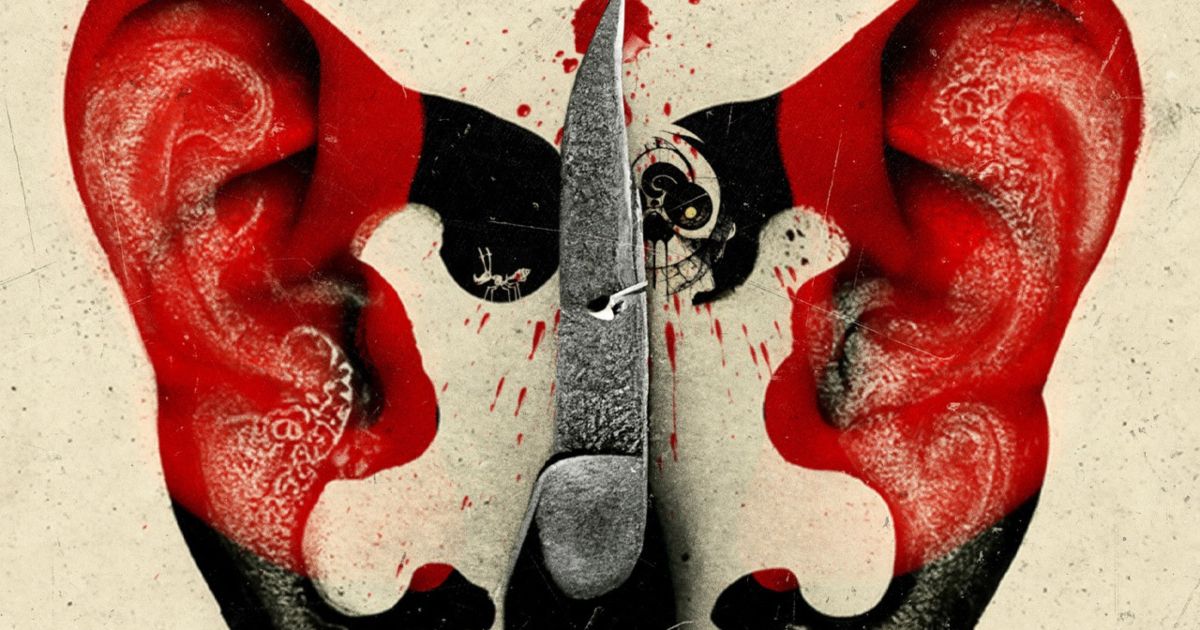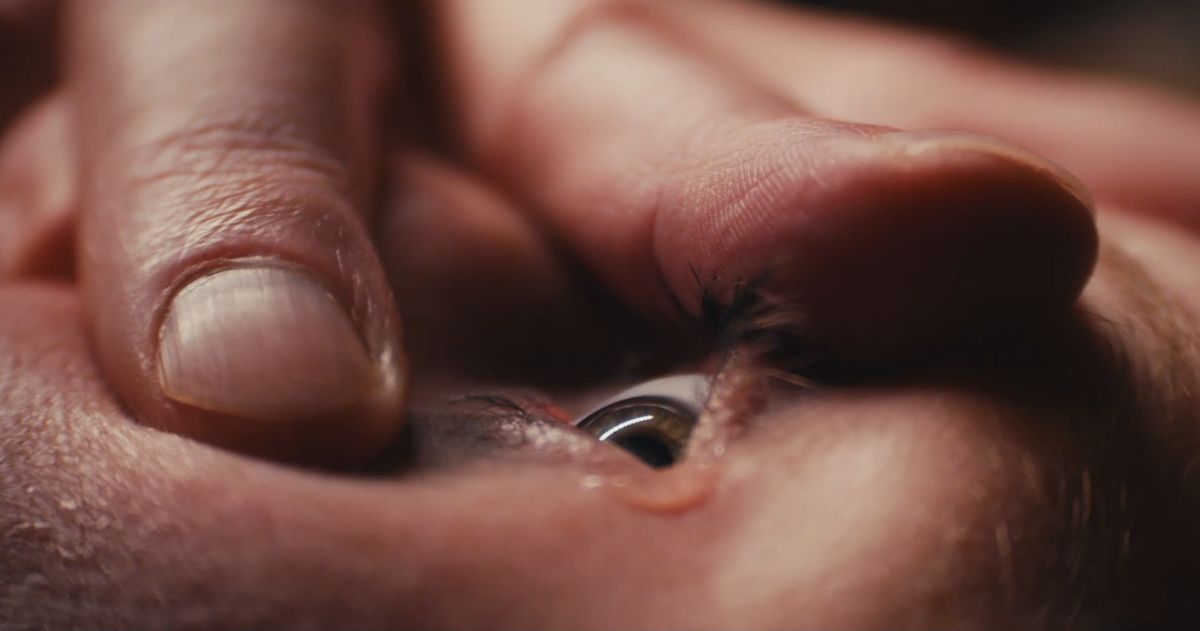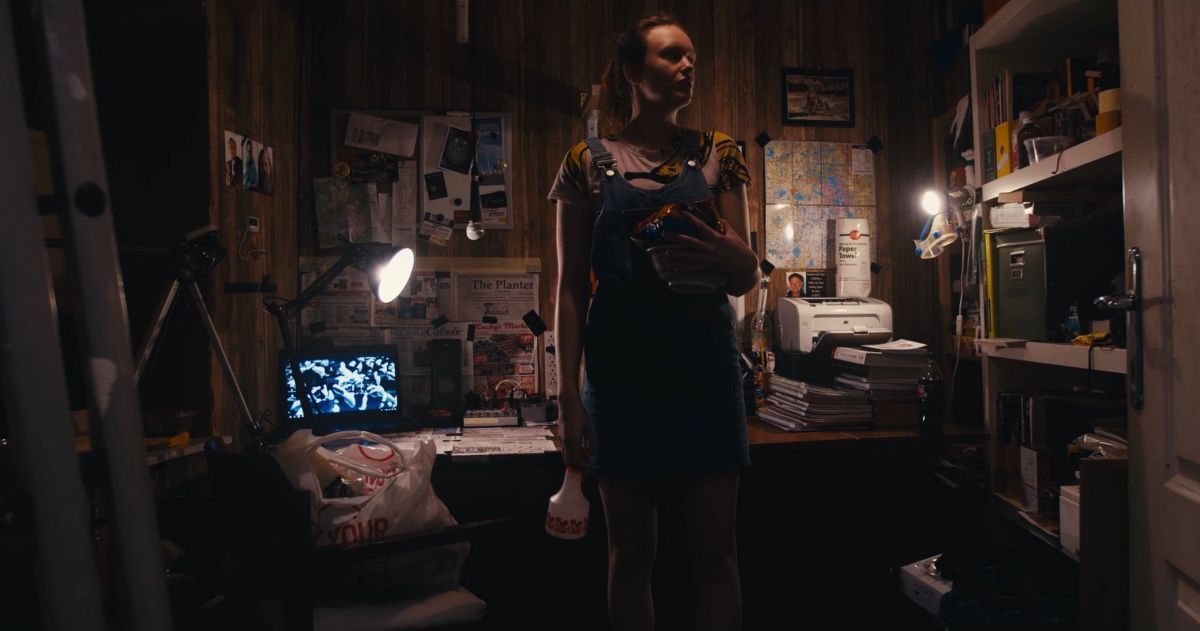The essay film has a long and lauded history, from the Dziga Vertov masterpiece Man With a Movie Camera and Orson Welles' F For Fake, to Chris Marker's Sans Soleil and Jonathan Caouette's Tarnation. However, it's never really been conducive to horror cinema. The essay genre relies on voiceover narration and a lack of characters, blending documentary and fiction to create audiovisual essays that are extremely personal to the filmmaker. Jump scares or blood and guts tend not to fit within those confines.
Filmmaker and all-around postmodern jack-of-all-trades Johannes Grenzfurthner begs to differ, and proves it with his new film Masking Threshold, which has garnered acclaim and made the rare transition between arthouse experiment and B-movie genre fandom. It's an essay film like few others, building in atmospheric dread as it burrows deeper and deeper down the rabbit hole of insanity. With ingenious editing, a strong narration, and masterful sound design, it's one of the year's most distinctive films.
Masking Threshold is told through the perspective of a man with tinnitus (voiced by Ethan Haslam). Holing up in his small apartment as he burns through all his sick days and personal leave, the man conducts a series of increasingly obsessive and insane science experiments to try and understand his condition, which he believes to be much more than a simple ringing in his ears. Grenzfurthner spoke with MovieWeb about the film and its relation to our current moment.
The Cosmic Horror of Masking Threshold
Like many essay films, Masking Threshold is a bit aimless and rambling but is packed full of philosophical reflection, intelligent references, melancholic musings, and disturbing truths as the unnamed protagonist shares his thoughts about life and his condition. He begins isolating objects and charting the changes in his tinnitus that each object provokes (whether physically or simply psychosomatically), but his experiments become darker and more intense, as do his thoughts.
The cosmic horror author H.P. Lovecraft was an influence on the film, which makes a lot of sense; generally told in the first-person from a disturbed man recollecting past events, Lovecraft found horror in how the unknown intersects with humanity's insatiable need to know and define things. The film quotes Lovecraft directly, signaling its incorporation of his major theme:
The most merciful thing in the world, I think, is the inability of the human mind to correlate all its contents. We live on a placid island of ignorance in the midst of black seas of infinity, and it was not meant that we should voyage far.
"I'm a huge fan. Of course, it's always hard to say that you're a Lovecraft fan, because the guy was a [expletive] racist," laughed Grenzfurthner in his typically blunt but jovial way. That idea of brilliance being interlaced with awfulness or madness, with Lovecraft as a case in point, is certainly an element of Masking Threshold — the man in the film contains many interesting thoughts and has great taste, but he is withdrawing into something terrible.
Grenzfurthner Finds the Horror in Obsessive Nerds
"I wanted to explore the idea of a nerd like myself going insane. How would I go insane?" asked Grenzfurthner. "So all the things that my protagonist says in the film, I would probably say, like if I would have a beer with you or something like that. So, content-wise, I actually completely agree with him on almost everything." Making a film about an obsessive nerd going insane in isolation seems extremely relevant. As such, Masking Threshold is a fascinating look at the way intelligent, sometimes brilliant people latch onto unprovable and often silly things and small details (QAnon and woke culture come to mind), and develop an unhealthy obsession with them.
"Nerds are always very obsessive people," said Grenzfurthner. "That obsession can project itself in a positive way — maybe you're a member of a hacker space, and you do interesting and cool things. But it can also flip in a completely destructive and negative obsessive direction. And we have seen stuff like that already, in the form of 'gamergate' and stuff like that." In a sense, obsession is the driving force of history. This positive obsession fuels scientific discovery, political accomplishments, and technological development; negative obsession, though, starts wars and brings down empires, not to mention minds. Negative obsession is Lovecraftian terminology.
Masking Threshold is About a Man Investigating His Tinnitus
"I wanted to portray this guy like in the classic Lovecraft sense — from the very beginning, you know that this is not going to end well," said Grenzfurthner. "What was interesting was finding a way that visually and acoustically, but also philosophically, gives a good reason why the guy goes insane in that way, why is worldview gets triggered and explodes in the end. For me, that was tinnitus." Tinnitus is a still rather mysterious condition in the inner ear that causes an uncomfortable ringing sound; nobody else hears it, and it seems to be the sound of your own body screaming in unknown tones.
"It's never clear if he's just insane or if there is really something lurking in the depths. But I needed something on a positivistic level that exists and is a phenomenon that people have a connection to," explained Grenzfurthner, "but also something that you can kind of dismiss, like maybe the guy is just making it all up."
It's a brilliant choice, because tinnitus literally is 'only in his head,' whether it's real or not. Doesn't that describe everything in some way? The light and color we experience in vision — that's all only happening in our head; our mind is the processing machine, and our body creates the sensation. What exists outside this? What is 'the thing in itself,' as Kant called it? This is the exact type of solipsism and ego that Masking Threshold so deftly explores.
Isolation Fuels Madness in Masking Threshold
"Most of the time, it's only the one person in his room, so he's a nerd that forgot the very important thing about 'nerdom' — you have to exchange yourself with other people," said Grenzfurthner. "The cool thing about being a nerd is learning. Of course, there's always this, 'I know more than you, I've seen more films than you, and I know more references than you' side of it. But that also can be something very positive. I mean, science in a certain way works like this." Grenzfurthner continued, illustrating how his protagonist relates to the 'nerds,' the suspicious conspiracy theorists, and the hateful keyboard warriors of today:
He's literally sinking into his desk. He's not outward-looking anymore. He's not interested in the world anymore. He has only bad words for the world. But he's so self-absorbed and so sure that he can solve the problem that he is really only looking at the desk and falling into it, and it's like the infinity of the microscopic. So he's losing himself in the details and not being able to see the bigger picture. I think he believes that through this microscopic view of the details, he thinks that he finds a cosmic relief of some kind. But again, it is not clear if that's true, or if he just turns from like a very skeptic Redditor into a true believer.
That kind of self-alienation has been going on for a lot of people, even before COVID; young men in particular are withdrawing from the world in staggering numbers, and the global pandemic only solidified this isolation. "It was interesting to see that I made this film, and then COVID happens. So many people in my close vicinity of nerds that I know just went completely crazy. And I felt like this is just strangely prophetic, that if you put people into a room and lock them up, something strange happens. And many people were locked up in a room for a long, long time and started to fall into their desk and only be able to see a small part of the world and only be connected with the Internet."
Masking Threshold Reflects Our Conspiratorial Times
It's no coincidence that we've seen an immense rise in conspiracy theories and extremist views since the global virus began, with many people staying at home and hoarding very specific, unreliable news. Thoughts about 'the deep state' and webs of conspiracies had already been festering, but the isolation of COVID lit the fuse, infecting millions. While Masking Threshold isn't explicitly political, it does provide insight into how someone can drop out of society, and the contagious obsessions which drive them to it. QAnon was an allegorical example for Grenzfurthner.
"QAnon suddenly became incredibly popular. I mean, it's such a conspiratorial masterpiece," said Grenzfurthner. "It's just the perfect meme. It's almost like reactionary malware installing in your brain, racist malware, and someone in our society has to find like a proper virus removal tool for it, but I don't see it on the horizon." Masking Threshold gets its title from the acoustics of multiple sounds, and the sound pressure level required to make a sound audible while other frequencies play out. In this way, the film invites us to look at the frequencies we pay attention to, the sounds that mask everything else; when we obsessively let one sound (or belief or thought) dominate the rest, everything else dies out.
There is always a virus waiting to infect us, and an obsession waiting to take hold. Sometimes, this is how the world turns. Other times, that's how it stops. Masking Threshold is a thrillingly detailed examination of the madness lurking in the corridors of all our halls. Produced by Grenzfurthner's art and theory collective monochrom, Masking Threshold is distributed by Drafthouse Films and is in theaters now, and will be available digitally on Oct. 7th.






